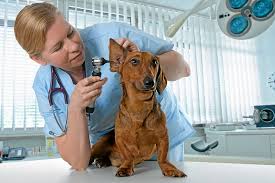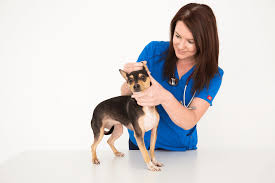Choosing a Veterinarian
Pets are part of the family. Your veterinarian, like your doctor or your dentist, is a major part of the well-being of your family. Because you have entrusted this person to oversee the health of your pet, and by extension the health of your family, it is crucial that you have a relationship with your veterinarian based on trust, confidence and respect. You want to know that your physician, your dentist and your veterinarian are among the best at their profession and that he/she fulfills the needs of you and your pet.
Unfortunately, there are not many ways of critically evaluating a health care provider until you need them in a critical time. And you don’t want to be in a crisis when you have to reassess your decision. So how can you evaluate your veterinarian to make sure this is the relationship you want? Resources such as Consumer Reports and Zagat’s will help you decide on a restaurant, a camera, a computer, or a car. But guidance on choosing healthcare providers is a lot harder to come by. It’s not a black and white decision. It’s more like Match.com for a professional relationship. It’s all about finding the right fit.
Where to look? Who to ask?
As is always the case, sitting down at your computer and searching the internet can provide you with a flood of opinions. You can spend hours scrolling through popular sites like Angie’s Llist and Yelp reading testimonial after testimonial after complaint about every veterinarian and clinic in your area. Clearly those postings are the unsolicited, heartfelt sentiments of people who were motivated (positively or negatively) to take the time to comment online. So, by all means read some of them. Just don’t rely exclusively on consumer or social web sites since they may not give you a truly balanced perspective. You might also want to seek the opinions of other pet parents you actually know and/or meet every day: neighbors, co-workers, other parents at your child’s school, people you see walking their dog or at a dog park. These other pet owners can be valuable sources of additional insight by nature of their own experiences.
It goes without saying that you want a veterinarian with a high level of medical competency, and you can get a feel about that from talking to other pet owners and finding out how their pets’ illnesses were handled: diagnosed, treated and managed. It is also important to recognize that not all veterinarians are equal in all ways. What local, state and/or national professional associations and organizations does the doctor belong to? What about specialization or special interests? There are specialty organizations that assure you that their members have advanced training in specialties ranging from surgery and internal medicine to feline medicine and exotic pets. Find out if your veterinarian has advanced training or experience, especially if your pet is unusual or already has special needs.

What’s most important to you?
Then ask yourself what other criteria are important to you. What clinic hours best fit with your own schedule? Can you use a hospital that is only open from 9A-5P or do you need the flexibility of night and/or weekend office hours? Drive by the hospital(s) you are considering. A veterinary hospital need not be an architectural showplace but it should be clean; located in a safe, convenient area; and have adequate parking. A veterinary hospital should reflect the pride and commitment not only of the owner(s) but of the entire staff. Cleanliness and hygiene should be apparent; maintenance should be readily achievable. Therefore, a dirty parking lot, smelly waiting room, or poor maintenance indicate a lack of that pride and commitment.
Beyond feeling comfortable with the physical structure and location, you need to feel personally comfortable with the people inside. The attitude and professionalism of the entire clinic team contributes to the experience you and your pet will have there. Simple friendliness, empathy and courtesy are important in any business and particularly in the emotionally stressful areas of medical care. Call the practice. Is the office staff efficient and courteous? Ask for a tour or make an appointment to meet the doctor(s) and other members of the team. Take your pet with you if possible. You want to be working with people you can communicate with and who have a good rapport with both you and your pet. Are you comfortable? Are they too formal? Or too casual? Or just right? Do you like the way they respond to your pet? Does your pet seem to like them (within reason, of course, given the circumstances)?
The major, most important question you should ask, of course, comes down to this: is the veterinarian caring of your pets and your family someone you trust and value? If so, acknowledge them and let them know how important they are to your family. Take care of that relationship. If you are not feeling well-served then tell your veterinarian what you want. Be honest and give them every opportunity to provide the relationship you want. Follow this advice and you should be able to find the perfect veterinarian for you and your pet.

Check If They’re Certified
To practice, all veterinarians need a license in their state (you can look them up here). If you’re looking for accreditation beyond that, you can start with the American Animal Hospital Association (AAHA). They require veterinarians to meet a specific set of standards in their practice. They also examine vet offices and equipment every few years to ensure they hold up to those standards.
Vets aren’t required to hold this accreditation and many of them don’t. If a vet isn’t AAHA certified, it doesn’t necessarily mean anything, but when a veterinarian is certified, you at least know they stick to certain standards. You can look up AAHA-accredited vet hospitals here.
Some vets are also members of the American Veterinary Medical Association (AVMA). It’s basically like American Medical Association membership for vets. Again, AVMA membership doesn’t necessarily mean better, but it shows that your vet is dedicated to the practice. Still, AAHA accreditation is probably a better indicator, as they have a specific set of guidelines offices have to pass to stay accredited.

Make a List of Local Veterinarians
Do a Google “Veterinarian near me” search
A Google “veterinarian near me” search is a perfect starting point. Your search will turn up a current list of local professionals. The results will include the requested “veterinarian near me” results. It may also show vets in your general area and in other parts of the state.
Before you start doing focused research or making calls, make sure the listed veterinarians are close enough so as not to inconvenience you when your pet needs care.
Google search results sometimes show street addresses but not always. If you can’t find a location on the search page, look for an address on individual veterinarian websites. You’ll usually find an address when you scroll to the bottom of the “Home Page” or by checking the “About Us” or “Contact Us” pages.
Get referrals from fellow pet lovers
If you prefer to avoid omnipresent search engines and you have friends and family members who also love animals, ask each person for a veterinarian recommendation. Don’t take it for granted that the person giving you a name and a number is pleased with their veterinarian’s care. Some pet parents keep seeing the same vet out of habit or because it’s easier or more convenient.
Points to Consider When Choosing a Veterinarian
TALK TO PEOPLE YOU KNOW WHO HAVE PETS.
An excellent way to begin looking for a veterinarian is to ask for recommendations. When you know or come across someone who has a pet, ask them for information! Talk to:
Friends
Family
Co-workers
Animal shelter staff
Animal trainers
Groomers
Pet sitters
Dog walkers
Boarding kennel employees
Dog owners at the dog park.
#2. FIND A VET TO TREAT YOUR PET WITH DIFFERENT NEEDS.
Not all veterinarians treat all types of animals. For example, some veterinarians only work on dogs and cats, and some only on livestock. If your animal is a bearded dragon lizard, you will want a veterinarian who has been trained to handle and care for reptiles. Or, if your pet is older, you may need a veterinarian who is trained to work with geriatric animals.
Finding a veterinarian with specialty training may take a little more effort. Information pertaining to active veterinarians that treat different types of animals and/or who have specialty training can be found through a web search of your location’s veterinary medicine associations. Look for veterinarians who are board certified as trained in the specialty area required by your pet.
#3. SEARCH ONLINE FOR ADDITIONAL INFORMATION.
The online site for the American Animal Hospital Association (AAHA) provides information on accreditation. Receiving AAHA accreditation is a statement that:
- The animal hospital has been determined to consistently provide safe, high-quality care
- Veterinary hospitals have maintained AAHA standards in relation to their:
- Facilities
- Equipment
- Quality of care
The services and equipment of these veterinary hospitals have been thoroughly evaluated as part of their responsibility to becoming accredited in areas involving:
- Examination
- Surgery
- Emergency care
- Radiology
- Pathology
- Pain management
- Contagious diseases
- Nursing care
- Dentistry
- Diagnostics
- Pharmaceutical
- Medical records
- Housekeeping and maintenance.